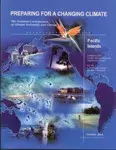Error message

|
This is a summary of the key findings and recommendations of the Pacific Islands Regional Assessment of the Consequences of Climate Variability and Change (the Pacific Assessment). The Pacific Assessment was conducted as a regional contribution to the first U.S. National Assessment of the Consequences of Climate Variability and Change (the National Assessment). The Pacific Assessment sought to nurture the critical partnerships necessary to develop and use climate information to understand and respond to the challenges and opportunities presented by climate variability and change. Based on extensive involvement of experts and stakeholders from diverse knowledge groups, the assessment aimed to combine research and analyses with dialogue and education. The Assessment was an exciting and highly interactive process involving over 200 participants who were engaged through small discussion groups and two key workshops organized to encourage and accommodate broad-based regional participation in research and dialogue. The Pacific Assessment sought to achieve two, mutually supportive objectives:
This dialogue allows diverse stakeholders to develop a shared understanding of climate effects and possible responses, and to use climate information to support decision-making. The concept of shared learning and joint problem-solving emerged as a defining characteristic of the Pacific Assessment and reflects an evolving paradigm of assessments as a process of dialogue among scientists and stakeholders. The chapters and appendices of the full report are also available free of charge as PDF files: |
|
This is a summary of the key findings and recommendations of the Pacific Islands Regional Assessment of the Consequences of Climate Variability and Change (the Pacific Assessment). The Pacific Assessment was conducted as a regional contribution to the first U.S. National Assessment of the Consequences of Climate Variability and Change (the National Assessment). The Pacific Assessment sought to nurture the critical partnerships necessary to develop and use climate information to understand and respond to the challenges and opportunities presented by climate variability and change. Based on extensive involvement of experts and stakeholders from diverse knowledge groups, the assessment aimed to combine research and analyses with dialogue and education. The Assessment was an exciting and highly interactive process involving over 200 participants who were engaged through small discussion groups and two key workshops organized to encourage and accommodate broad-based regional participation in research and dialogue. The Pacific Assessment sought to achieve two, mutually supportive objectives:
This dialogue allows diverse stakeholders to develop a shared understanding of climate effects and possible responses, and to use climate information to support decision-making. The concept of shared learning and joint problem-solving emerged as a defining characteristic of the Pacific Assessment and reflects an evolving paradigm of assessments as a process of dialogue among scientists and stakeholders. The chapters and appendices of the full report are also available free of charge as PDF files: |




